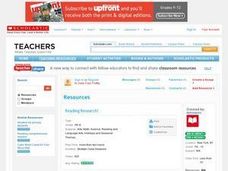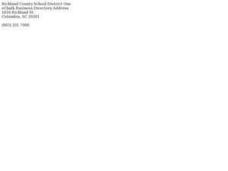Curated OER
Learning about Snakes- Non-Fiction Reading Comprehension Worksheet
For this snakes non-fiction reading comprehension worksheet, 3rd graders read a one page selection about the characteristics of snakes. They complete a table which compares snakes to mammals, and fill in the blanks in 5 questions using...
Curated OER
Marvelous Mammals- Non-Fiction Reading Comprehension Worksheets
In this mammals non-fiction reading comprehension worksheet, 3rd graders read a one page selection about the characteristics of mammals. They answer 10 questions based on the reading including true and false, short answer, and multiple...
Curated OER
Reading Comprehension- Informational Passages "Pollution"
Practice reading comprehension through this pollution worksheet, which has learners read an informational passage on various aspects of environmental harm. Key terms are in bold, and are used on the next page in the comprehension...
Curated OER
Let's Get it Together! Reading to Learn
Let’s learn about frogs! Young readers are led through “Freaky Frogs,” a non-fiction article. Teach learners how to edit an article so there are fewer details to sift through. After talking through the article, they learn the six steps...
Curated OER
Parts of a Plant- Non-Fiction Reading Comprehension
In this parts of a plant non-fiction reading worksheet, students read 2 pages that describe the parts of a plant and their jobs. They answer 10 fill in the blank and 2 short answer questions based on the reading.
Curated OER
Sand Dollars- Non-Fiction Comprehension Worksheet
In this sand dollar non-fiction reading comprehension worksheet, 5th graders read a 2 page selection about the life cycle and habitat of sand dollars. They use a dictionary and the article to define 10 words, and write the answer to 7...
Curated OER
Rachel's Life is in a Hole
Explore how lack of access to water impacts peoples' lives in poor countries. Through text reading and discussion, middle schoolers are presented with the story of a young girl who lives and functions with limited water resources. They...
Curated OER
Wood
Students practice reading comprehension strategies. In this literacy and science lesson, students read a non-fiction article about wood and locate main ideas and details. Students construct a card game using information taken from the text.
Curated OER
Natural Disasters: An Adventure in Non-Fiction
Students study different natural disasters. In this natural disaster lesson students read a nonfiction book followed by a discussion, an experiment, then collect illustrations from their experience.
Curated OER
Non-Fiction Read-aloud
Students listen to the reading of a book about the area of science they are currently studying.
Curated OER
Butterfly, Butterfly: Teaching Vocabulary
Kindergarteners practice new words through listening to and reading the science book Butterfly by Jenny Feely. The teacher will first choose words that are essential for understanding the text. Then, using pictures in the text,...
Curated OER
Put A Scientific Spin on Teen Read Week!
Celebrate Teen Read Week by incorporating literature into your science curriculum.
US Department of Agriculture
George Washington Carver Coloring and Activity Book
Learn about the interesting life of George Washington Carver and his many accomplishments with this series of worksheets for primary grade learners. From coloring pages and word searches, to non-fiction reading passages and math skills...
Curated OER
Reading Research!
Students investigate the life of an animal and how it responds to winter. The lesson's focus is on reading and research skills using pictures to assist in the understanding of the information presented.
Curated OER
Under The Sea
For this resource lesson, young scholars use non-fiction books to research ocean animals. Students discover the many features of non-fiction books and how to use these features to help them conduct research. Young scholars then...
Curated OER
Reading Research!
Students observe the pictures in non-fiction books that focus on animals in the winter. In addition, they also listed to some read aloud books about hibernation, migration, adaptation and dormancy. Students draw pictures and write notes...
Curated OER
Real or hoax?
Seventh graders brainstorm a list of criteria that makes a webpage useful for research and not useful for research. They complete the activity, "Real or Hoax," and discuss fiction and non fiction stories and determine which websites are...
Curated OER
The Dirt We Depend On- Characteristics of Dirt Reading Comprehension Worksheet
In this reading comprehension activity, students read a selection about dirt and soil characteristics. They answer 10 matching questions and 5 multiple choice questions based on the information given in the non-fiction article.
Curated OER
The Dirt We Depend On; Soil Destruction and Conservation Reading Comprehension Worksheet
In this soil destruction and conservation worksheet, students read a three page non-fiction article. They answer 10 fill in the blank questions and 1 short answer question based on the reading about soil building methods.
Curated OER
The Dirt We Depend On; How Soil Was Formed Reading Comprehension Worksheet
In this soil formation reading comprehension worksheet, students read a 2 page non-fiction article. They answer 19 questions including fill in the blank, multiple choice, and true or false about weathering of the Earth as soil is renewed.
Curated OER
Science Summaries are the Bomb!
Fifth graders read a dissection article and complete close reading activities for the text. In this reading skills lesson, 5th graders read an interactive frog dissection article in teams. Student teams complete a KWL chart and...
National Geographic
Plant Life
Looking for a guide to pair with non-fiction concept books? Intended to go with science-based leveled text mentioned in the resource, a unit allows for the study of plant life while enhancing academic vocabulary, language skills, and...
Consortium for Ocean Science Exploration and Engagement (COSEE)
Understanding the Food Web
Building on prior knowledge of the pervious lesson in the series, pupils explain the previous lesson to each other. Then they write a simple guide for a young child to read on the same topic.
Curated OER
Fact or Fiction? Urban Legends and Misconceptions
High schoolers are introduced to a process for using web site resources to verify the accuracy of biology information. They follow a guided lesson on evaluating web sites and determining content accuracy. They select a piece of unusual...























